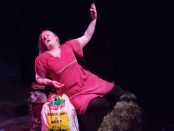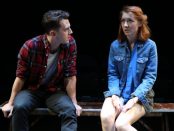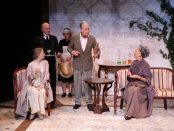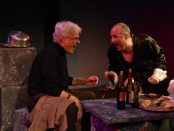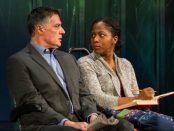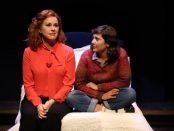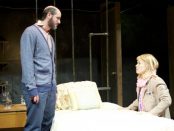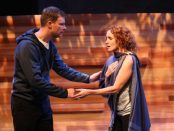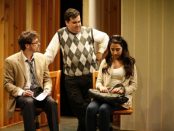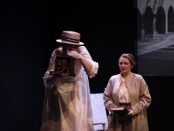59E59 Theaters
The Drama Desk Award-winning 59E59 Theaters is the number one Off-Broadway destination in New York City. In the heart of Midtown, just east of Central Park, 59E59 Theaters is a spectacular modern theater complex with three stages and a lively bar on the mezzanine level. http://www.59e59.org/
Summer Shorts 2017: Festival of New American Short Plays – Series B
While the three plays in Summer Shorts 2017: Festival of New American Short Plays – Series B have been given proficient productions each seems ultimately unsatisfactory. All seem like first drafts rather than completely fulfilling their potential. The three authors could learn a lesson from the three plays in Series A which all hit their marks. Interesting experiments but failures nevertheless. [more]
A Real Boy
Stephen Kaplan’s "A Real Boy" is about a pair of puppets, named Peter and Mary Ann Myers, who adopt the eponymous child named Max, and it proves about as preposterous as such a premise suggests. It isn’t helped by director Audrey Alford’s often awkward staging, or by a muddled and confusing conclusion. [more]
Places
"I wanted the audience to see 'Places,' not as a ‘museum’ piece, but a piece that was relevant TODAY. Nazimova was fighting the things in the 19th century and early 20th century that we are still fighting…," explains Nordlinger, who also wrote the show, in publicity materials for the production. Her conceit is that Nazimova exists as a ghost and cheekily addresses the audience directly. Her skillful, well-researched and assembled biographical facts are laced with feminist slanted commentary, and knowledge of events that occurred after Nazimova’s death. [more]
Underground
Two likeable people, James (Michael Jinks) and Claire (Bebe Sanders) meet online, have dinner in a local pub owned by Steve (Andrew McDonald) and take the Underground home. That’s about it. Of course, that’s only the basic, very basic, outline. What makes "Underground" a quiet delight is the way van Tricht takes this trite situation and beefs it up with insightful conversation, intriguing situations that border on the fantastic and a clear empathy with her characters. [more]
Invincible
Betts' "Invincible" has been compared to Alan Ayckbourn’s work. Although there are similarities, particularly in Betts’ ear for capturing the jargon of his characters and his feel for social class distinctions, Ayckbourn’s plays are more delicately constructed and make their points—whether social or emotional—more cleverly than Betts. Even so, Invincible—the title a football reference—is satisfying as both a comedy and a drama, breaking more than a few hearts. [more]
Rotterdam
An import from the United Kingdom, as part of the 2017 Brits Off Broadway Festival at 59E59 Theaters, Jon Brittain’s "Rotterdam" is not based on a true story relating to events in the eponymous Dutch city. It rather focuses on a British lesbian couple, one of whom decides at the beginning of the play that she’s really a man and really wants to become transgender. The crux of the drama is between Alice and her lover Fiona, who, in the course of the play, becomes Adrian. But why the two of them moved to Rotterdam seven years ago, is never really answered in the play--rather posed as a recurring question--along with the question of whether or not they’re going to remain there. [more]
Iphigenia in Splott
The writing is poetically descriptive and moderately engrossing with plentiful profanity. It is, however, a decidedly grim scenario despite abundant humor. The conclusion is a rhetorical and optimistic rallying cry for social justice. The themes and message are all very well realized in this production. [more]
Fossils
Though the printed script, such as it is, is credited to Nel Crouch, Crouch is listed in the program as only the director, and "Fossils" is rather “By” Bucket Club, described as an “associate company.” Such confusion is perpetrated throughout the production: it’s hard to say if, in the end of this extremely low-tech presentation, Vanessa has actually encountered the Monster--and/or her father--or not. "Fossils" is apparently more about what doesn’t happen than what does. [more]
The Roundabout
Although the play seems to have something to say about economics and political systems, it is simply a very light romantic comedy making use of elements of change during the Great Depression. Ross’ production is quite proficient and fast-paced, but the characters are generic and we don’t learn much about them. As Lord Kettlewell, Brian Protheroe is the typical crotchety but wise aristocrat, Richenda Carey is most eccentric as the impoverished Lady Knightsbridge, and Lisa Bowerman is level-headed as the previously estranged Lady Kettlewell. Carol Starks’ Mrs. Lancicourt is the manipulative upper-class woman who attempts to dominate all situations. Hugh Sachs is a raisonneur straight out of classic drawing room comedy and would have been as at home in a play by Wilde, Shaw, Pinero or Galsworthy. [more]
Angel & Echoes
Presented together on the same bill, "Angel & Echoes" is part of the Brits Off Broadway Festival at 59E59 Theaters (where, it’s worth noting, "Echoes" originally played last year). As written by Naylor, enacted with ferocity and vitality by Avital Lvova, and directed with dispatch by Michael Cabot, "Angel" proves the far more effective (second) half of the evening. That may be because it’s told with an in-your-face immediacy and gumption that elude Echoes, which juxtaposes the lives of two different women, who lived in that region of the world at very different times. [more]
A Gambler’s Guide to Dying
“To some he was dad, to some he was mate,” says McNair, at the top of his monologue, “to others he was liar, cheat, addict, hero, story teller.” Over the course of the next 70 minutes, McNair will also do, with modest effects and a modicum of success, other voices including his much younger self, a schoolteacher, mates of Archie’s, and even his own mother. Through it all, the one thing we never lose sight or sound of is his love for his grandfather. [more]
Beneath the Gavel
Bated Breath Theatre Company specializes in original works inspired by and in partnership with museum collections and exhibitions. However, this show about the fate of the “Haddie Weisenberg Collection” painted by artist Daniel Zeigler appears to be entirely fictional. Written and directed by Mara Lieberman, executive artistic director of the company since 2012, the play uses six actors in 43 different roles from artists both famous and imaginary, to auction house sales personnel and staff, to collectors to dancers, as well as having actors impersonate free standing sculptures. Ironically, 59E59 Theaters was at one time part of Christie’s Auction House and Theatre B was actually one of the firm’s galleries. [more]
Sam & Dede, or My Dinner with Andre the Giant
Beckett lived in rural France, and his nearby neighbor, Boris Roussimoff, helped him build a cottage on his property in 1953. Beckett grew close to the family, and offered to drive Andre to school, as the boy was reluctant to take the bus. This was because he suffered from gigantism and was self-conscious about his appearance and his difficulty in fitting into the bus. By the age of 12, he was 6’ 3” tall and weighed 208 lb. [more]
White Guy on the Bus
Musical star Robert Cuccioli has to call upon his experience playing both Dr. Jekyll and Mr. Hyde to become Ray in "White Guy on the Bus," a first-rate, new play by Bruce Graham, that has more than a stunning surprise or two, as it spreads out the story like a wild brush-fire burning out of control. His complicated and duplicitous “numbers man” character wants, from the beginning, to quit his high-paying job, and, like the French painter Gauguin, escape from the workaday world of banking and finance. “I don’t want to sell the house,” he tells his wife Roz in the opening scene. “I want to sell everything.” [more]
Kunstler
In "Kunstler," playwright Jeffrey Sweet recounts the defense attorney’s life and career in his well-written, comprehensively researched, and affectionate treatment. The conceit is that Kunstler is to address an audience of law school students at a university. Kerry is a young woman who is the vice-chair of the program committee attends him to him and becomes his foil, and is the play’s secondary character. This construction allows for a free wheeling manner of imparting the chronological details. It’s a solid take that could have certainly been at least a routine biographical exploration, but is undone here by the odd casting. [more]
The Dressmaker’s Secret
The playwrights have a keen understanding of this place and time, helped by the simple, but telling scenery of Stephen C. Jones, who also lit the small performing space to give the illusion of multiple settings. Molly R. Seidel’s costumes also hit the nail on the head as far as period and character are concerned. The glamorous dress Mária creates for Irma is in direct contrast to her own dreary housedresses, and Robert’s fancy western style suit makes Robi even more eager to leave Romania. [more]
Made in China
The ensuing journey is a bizarre and sometimes hilarious exploration of China and the culture within, even if it doesn’t always make the most sense. "Made in China" makes the most of the liberties that puppetry allows, and features some very impressive techniques and performances from the actors behind the scenes. Though the two main characters are both interesting, they are both made all the more entertaining by their canine companions. The two dogs, Lily and Yo-Yo (Dorothy James and Andy Manjuck among others) are completely lovable, and every single scene they are a part of is instantly heartwarming. [more]
Albatross
What Evett delivers—using ample quotes from the poem and robust contributions from himself and Spangler—is a terrifying inside look of the Mariner’s experiences, beginning with being hijacked by a friend at a pub. He breathlessly illuminates what the day-to-day life was like with lurid descriptions of illnesses and exciting second-by-second reports of battles with other ships. [more]
2017 LaBute New Theater Festival
Reading David Foster Wallace’s Infinite Jest while lying on a couch is Jay, a slacker-looking type in his 30’s. Sitting in the living room nearby is his 60ish mother who enjoys watching Dr. Phil on television and complaining about her ailments. Gabe McKinley’s Homebody is an enthralling black comedy with shades of Grey Gardens. Mother and son bicker, rehash recriminations and share their joy over the possibility of Jay’s novel being published. In 35 minutes, Mr. McKinley delivers a very well written, plotted and satisfying one-act play. It’s so pleasurable that a full-length version would be most welcome. [more]
Life is for Living: Conversations with Coward
Green’s dry delivery is in the Coward manner, crisp, almost spoken to the music, with impeccable diction. Shrubsole’s accompaniment supports him without ever getting in the way. The most famous song is probably “I Went to a Marvelous Party,” and there are five songs from Coward’s last all-original Broadway musical "Sail Away." However, there are also unfamiliar songs from "After the Ball" (“Something on a Tray”) and" Pacific 1860" (“I Saw No Shadow”), London shows that never made it to Broadway. In addition is “London Pride,” recently heard in the rediscovered post-war musical, "Hoi Polloi." Stand-alone songs include the poignant “There’s No More to Say about Love” and “I Travel Alone.” [more]
His Royal Hipness Lord Buckley
Raucous highlights include a jive reinterpretation of A Christmas Carol, “by Chazzie D, about a cat called Scrooge...who lives in Scrooge Tower.” There’s also Buckley’s irreverent take on The Gettysburg Address, “I’m a Lincoln cat.” Intertwined are Broder’s cool renditions of “On The Sunny Side of The Street” and “Georgia On My Mind.” He also demonstrates excellent saxophone and tambourine playing. [more]
Terms of Endearment
It isn’t until the second act of Dan Gordon’s stage adaptation of "Terms of Endearment," based on both the Larry McMurtry novel as well as the Academy Award-winning screenplay by James L. Brooks, that the play takes off. Featuring the now grown-up film star Molly Ringwald in the role of Aurora Greenway that won Shirley MacLaine the 1984 Oscar for Best Actress, the first act jumps around, skipping huge chunks of time as you can in movie cutting, but seems like something is has been left out on stage. [more]
Don’t You F**king Say a Word
Though the premise is an interesting device for dissecting the friendship between two men--for surely many men are curious how they are perceived by their better halves (self included), the play doesn’t aim to say much otherwise. Acting choices, pacing and thematics are all appropriate thanks to Lee Sunday Evans' seamless direction, but it’s the script itself which is the production’s biggest hurdle. Though there are some interesting and engaging ideas presented regarding the mind of the male, the untidy and nondescript ending make no attempt to make any significant statement about any of it, ultimately shrouding the entire production in a veil of murky, middle-ground mediocrity. [more]
The Collector
Healy’s treatment is faithful to the novel with a good deal of it being Clegg’s narration addressed to the audience. There are lengthy conversations between Miranda and Clegg, and her escape attempts are depicted. No matter how skillful Healy’s stage version is, it’s still two hours of often-philosophical talk between two characters in an unpleasant situation. [more]
The Clearing
Playwright Helen Edmundson whose stage plays have been mostly adaptations of famous literature ("The Mill on the Floss," "War and Peace," "Anna Karenina," as well as "Coram Boy" and "Thérèse Raquin" both seen on Broadway) tells her story in the leisurely way one might write a novel. While the material is both shocking and surprising, director Pamela Moller Kareman has undercut the inherent tension in the play by the choices she has made. [more]
Orwell in America
Grand highlights of Mr. Horton’s dynamic work includes an analysis of "Animal Farm" while he erases the novel’s seven animal commandments that are written on a blackboard as they are overturned one by one, by the pig Napoleon who represents Josef Stalin. There’s also a dramatic demonstration of American versus British rationing during W.W. II as Orwell produces bountiful American foodstuffs comparing them to the meager provisions allowed in Great Britain. [more]
Bears in Space
"Bears In Space" is a story-within-a- story. An interstellar archivist, who collects “every story in the universe,” enjoys having his sons (Bertram, Darcy and Lady Susan Vernon) regularly act out his favorite tales. The Story Keeper, as the archivist is known, invites the audience to “bear” witness to the telling of one of his prized narratives from his galactic library -- "Bears In Space." The celebrated Irish theatre company, Collapsing Horse, employ their adept puppetry, comedic talents, linguistic prowess (including the fine art of punning and utilizing malapropisms to artistic advantage), and clever music making "Bears In Space" a delightful farce for puppet, improv, Disney and Simpsons’ enthusiasts alike. [more]
The Birds
Unlike the original short story which was set on a rural farm in Cornwall, England, and the film which was reset in Bodega Bay, California, the play takes place entirely in the main room of an isolated house in New England. Stefan Dzeparoski’s production which puts the audience in the same room with the characters has its strengths and weaknesses making this an evening of mixed success. [more]
Maestro
Felder’s play begins with a video of the actual Leonard Bernstein delivering a colorful, yet entertaining, illustrated lecture on music. When Felder sashays down the aisle, a cigarette in one hand and a drink in the other, the lack of resemblance is, at first, bothersome. But, somehow, sitting at a piano—which he plays impeccably—his monologue pulls you into Bernstein’s tumultuous life story. [more]
Touch
Toni Press-Coffman’s "Touch" is a rather challenging play both in that a great deal of it is narrated in recollection and also that it deals with much naked emotion. The cast led by Peter McElligott who is onstage almost throughout the evening could not be bettered. Director Nathaniel Shaw has made this under-dramatized play into a more theatrical experience. While Touch will not be for everyone, it is an impressive document of the workings of the human heart. [more]
Summer Shorts 2016 – Series B
Richard Alfredo’s 'The Dark Clothes of Night," a brilliant parody/homage to film noir and hardboiled fiction, the third play of Summer Shorts – Series B, is so good it alone is worth the price of admission. The other two plays which precede it in this year’s 10th Festival of New American Short Plays have interesting but undeveloped premises. But "The Dark Clothes of Night" is an instant classic, a humorous satire that is also a brilliantly theatrical study in paranoia, fear and evil and the elements that made film noir irresistible. Directed by playwright Alexander Dinelaris, the three actors in this memorable short work play multiple roles with assurance and aplomb. [more]
Alice in Black and White
"Alice in Black and White" is a play-within-a-play. Two parallel stories are told: one of Austen’s life and relationship with Gertrude Tate, her companion for over 40 years; and one in the early 1950’s involving a Staten Island Historical Society receptionist and journalist Oliver Jensen, who later published "The Revolt of the American Woman" (which included Austen photographs) and a Life magazine article on Austen. [more]

